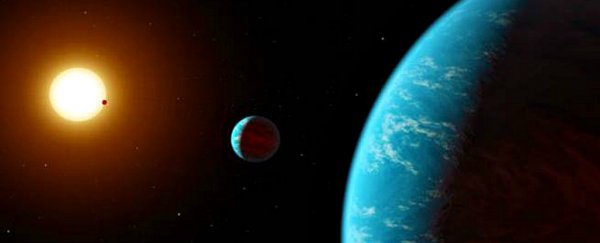In an exciting first, Indian scientists have discovered a sub- Saturn exoplanet orbiting a Sun-like star around 600 light-years away.
The planet has been named EPIC 211945201b or K2-236b and it's big - around 27 times more massive than Earth. The find sees India join a small group of countries to have confirmed a planet outside our Solar System.
Exoplanets themselves aren't that rare these days - we have confirmed the existence of 3,786 of them.
But the vast majority (~2,600) have been spotted and then confirmed as planets by NASA's Kepler space telescope.
This latest planet was also first spotted and listed as a candidate planet by Kepler, but it was a team of Indian scientists that confirmed it was a planet, rather than simply a comet or another astronomical object - which is the tricky part.
 (ISRO)
(ISRO)
The team was led by Abhijit Chakraborty from the Physical Research Laboratory (PRL), Ahmedabad.
They spent a year a half at PRL's Gurushikhar Observatory in Mount Abu, India, studying the changes in light coming from the planet's host star, EPIC 211945201 or K2-236, and performing an independent confirmation of its mass.
"We report here strong evidence for a sub-Saturn around EPIC 211945201 and confirm its planetary nature," the team reports in the American Astronomical Society's Astronomical Journal.
While the planet is orbiting a Sun-like star, it's also roughly more than seven times closer to its star than Earth is to the Sun, which means the temperature could be around 600 degrees Celsius and likely too hot and dry to support life.
Here's what we know so far:
- EPIC 211945201b's mass is around 27 times that of Earth's and it's estimated to be around six times greater in radius.
- The planet orbits a Sun-like star 600 light-years away.
- It's estimated to be more than seven times closer to its star than we are, which means a year lasts just roughly 19.5 days.
- It also means the planet's surface temperature is roughly 600 degrees Celsius.
Importantly, this discovery could help scientists understand how these types of planets form so close to their host star.
Beyond that, it shows that India now has the technology and expertise to confirm exoplanets on their own.
The Indian Space Research Organisation (ISRO) has made great strides in recent years, setting new records for satellite launches and putting a probe into orbit around Mars - all for incredibly efficient prices.
Obviously when it comes to space, it doesn't matter who's doing the research. But having more minds and telescopes searching our galaxy for signs of extraterrestrial life or even future homes for humanity is never a bad thing.
The planet confirmation has been published in The Astronomical Journal and you can read it in full over at arXiv.org.
